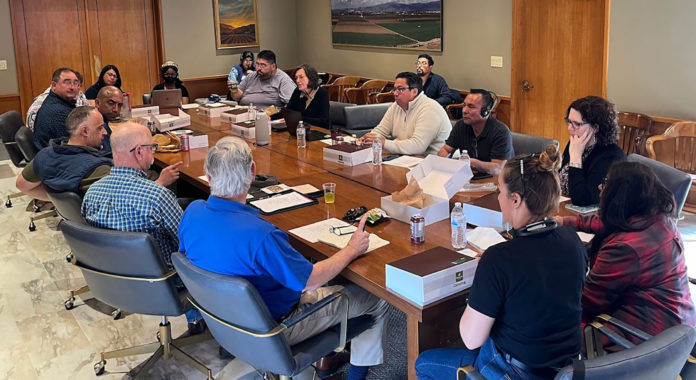
CENTRAL COAST — Despite significant progress since the release of a landmark 2018 farmworker housing study quantifying critically overcrowded housing conditions for agricultural workers in the region, thousands more homes are needed to relieve severe overcrowding, unaffordable rents and ensure the stability of the regional workforce.
Leaders from a wide variety of sectors met recently at the Grower-Shipper Association of Central California’s headquarters in Salinas as part of the Salinas and Pajaro Valley Farmworker Housing Study Oversight Committee to review the progress made since the release of that study — notably, the creation of hundreds of new permanent homes for families, and more than 4,500 beds for seasonal and resident workers in the agricultural industry.
But there remains a huge need for thousands more homes: The original study estimated that 45,560 new homes were needed to relieve critical overcrowding, unaffordable rents and ensure the stability of the regional agricultural workforce.
“Through these collaborations, our region continues to build momentum to address the affordable housing needs for agricultural workers in the Salinas and Pajaro valleys,” said Tahra Goraya, president and CEO of Monterey Bay Economic Partnership (MBEP). “The shortfall of safe, affordable housing in our region extends beyond municipal boundaries and beyond the scope of any one organization, which is why MBEP is leading efforts to convene stakeholders to reduce barriers to build housing of all types and at all levels.”
Prepared by the California Institute for Rural Studies and the California Coalition for Rural Housing, the Farmworker Housing Study and Action Plan for Salinas Valley and Pajaro Valley was funded by a collaboration of county and city governments, affordable housing developers and nonprofit organizations. The 502-page report detailed the conditions many low-wage agricultural workers endure to keep a roof over their heads, including sometimes sleeping in trailers, garages and sheds, or renting floor space in living rooms or other non-bedroom locations.
The report estimated that 91,433 workers were employed in agriculture in the region and that 45,560 additional units would be needed just to alleviate critical overcrowding.
The regional action plan set a goal to build 5,300 permanent, affordable housing units over the next five years. The goal was adjusted to develop 250 permanent farmworker homes for families on an annual basis.
Nonprofit developers, in partnership with local governments and state and federal agencies, have developed housing that is in the process of being built or has come online recently in Greenfield, East Garrison and Castroville (unincorporated Monterey County), Watsonville and Freedom (unincorporated Santa Cruz County).
“These affordable communities take several years to develop, and multiple layers of financing, which are extremely challenging to assemble,” Goraya said. “Monterey Bay Economic Partnership is working to secure more funding and to streamline these projects and add more to the pipeline.”
The Salinas and Pajaro Valley Farmworker Housing Study Oversight Committee includes representation from agricultural business leaders, local governments and elected officials, nonprofit and labor organizations, and nonprofit developers.
Among those in attendance at the April 17 meeting were representatives from the Grower-Shipper Association of Central California, the Monterey County Farm Bureau, the cities of Salinas, Gonzales, Watsonville and Monterey, the County of Santa Cruz, the office of California State Speaker Robert Rivas, the Center for Community Advocacy, Building Healthy Communities Monterey County, FarmLink, Monterey Bay Central Labor Council and United Farm Workers, CHISPA, Eden Housing and MidPen Housing.
The Oversight Committee will reconvene later this year to focus on the region’s farmworker housing project pipeline development.
“As a regional organization, MBEP has a lead role in the implementation of the study’s Action Plan and is working to turn that data into action,” Goraya said. “MBEP’s Housing Initiative takes a strategic approach to build consensus, drive policy and create funding mechanisms to support the construction of permanent farmworker housing.”
Since its inception, MBEP’s Housing Initiative has worked to bring housing-related issues into focus, to build, educate and empower a broad coalition of community members, local employers and organizations necessary to bring about change, from policy to public opinion, that will bring new housing units of all types to the region.









